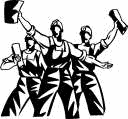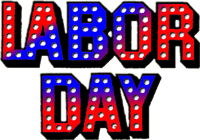
Putting The "Labor" Back In Labor Day
by Region 8 Webmaster John T. Davis
On Monday, September 06, 2004 the country
will once again observe Labor Day. This federal holiday dates back to
1895, when Congress passed a law observing the first Monday in September
as Labor Day.

Over the course of time many Americans have come to view Labor Day as
simply the last bash of summer. We have come to use Labor Day as a measurement
that summer is over, when actually the day means much more than that.
It is a day set aside to honor America’s workers and the contributions
they have made to build the mightiest nation on the Earth. See what separates
the United States from third world countries is not the rich and poor,
for these countries have rich and poor as well. It is the working class
– the Middle American who has carried our hopes and dreams into
reality.
For 364 days a year the business headlines are filled with the Bill Gates,
Donald Trumps and Warren Buffets of the world, but on that one day a year
our attention turns to America’s workers. Our history is filled
with visionaries such as Henry Ford, Ransom Olds and David Buick. However,
there is little mention of the engineers who charted their visions into
actuality or the workers who actually assembled the dreams. The media
reports of corporate heroes who lead the charge as fortunes are made and
society enhanced. But we never read of those on the front lines making
the difference.
Now this is not to diminish the role that has been played by America’s
corporate visionaries. Without the Rockefellers, Vanderbilts and others,
our economy would never had grown to be the greatest in the world. But
we must remember, that any successful venture requires those at all levels
of an organization to be great. Labor Day is designed to remember those
workers – the nameless, faceless millions who have fed the machine
of industry.

The iron horse led the charge in taming the American frontier out west.
The coming of the railroads brought commerce and towns to areas that had
for centuries been wide-open prairies. However, that iron horse needed
steel rails to gallop on as immigrant workers from China, Ireland, German
and other countries graded the roadbed, laid the ties, drove the spikes
that put American commerce westward.
The first spike of growth in America took place in the East, as Philadelphia,
New York, Boston and Washington D.C. became major cities. Buildings where
erected, highways built and dreams planted. The promise of a better life
spread across Europe, as Ellis Island watched millions cross that gangway
to hope from steerage accommodations. Each wide-eyed and idealistic about
the future and a new chance.
Still other Americans arrived in the belly of slave ships, with no choice
and no voice. It would take generations before these Americans dreams
could be realized. Still, while they had no voice, their sweat helped
drive an industry that fed the American economy. Chicago became the gateway
to the Mid-West as agriculture created markets, produced fortunes, fed
and housed families and built the land.

In 1869, 17 year Irish immigrant Peter McGuire began an apprenticeship
in a piano shop in New York City. In the spring of 1872, Peter McGuire
and 100,000 workers went on strike and marched through the streets, demanding
a decrease in the long working day.
This event convinced Peter that an organized labor movement was important
for the future of workers' rights. He spent the next year speaking to
crowds of workers and unemployed people, lobbying the city government
for jobs and relief money.
The idea of organizing workers according to their trades spread around
the country. Factory workers, dockworkers and toolmakers all began to
demand and get their rights to an eight-hour workday, a secure job and
a future in their trades. Peter McGuire and laborers in other cities planned
a holiday for workers on the first Monday in September, halfway between
Independence Day and Thanksgiving Day.
On September 5, 1882 the first Labor Day parade was held in New York City.
Twenty thousand workers marched in a parade up Broadway. They carried
banners that read
"LABOR CREATES ALL WEALTH," and "EIGHT HOURS FOR WORK,
EIGHT HOURS FOR REST, EIGHT HOURS FOR RECREATION!" Peter McGuire
and Matthew Maguire, a machinist from Paterson, N.J., proposed the holiday.
Within the next few years, the idea spread from coast to coast, and all
states celebrated Labor Day. In 1894, Congress voted it a federal holiday.
The 1800th century passed into the 1900th, as major cities grew and flourished
across the land. Detroit became the birthplace of the “horseless
carriage” as this new invention became the rage of the land. Automobiles
provided America with personal transportation. The demand created an economy
all its own, that drove the creation of factories to assemble this newfound
wonder. Of course components would be required for their assembly, so
the economy flourished again. As more and more Americans began to own
their own vehicle, the need for roads grew. This provided another boost
to the economy. Everyone knows that vehicles need fuel and repairs, so
another subset of jobs were created.
As jobs and workers multiplied, so did the need to provide rights for
the workers. In December of 1936, key GM plants in Flint go on “sit
down strikes” for union representation. The strikes ended on February
11, 1937 with GM recognizing the UAW as the bargaining agent for its workers.
A. Philip Randolph helped form the Brotherhood of Pullman Porters in 1925,
and fought for representation for porters until 1937.

Over the next 30 years UAW visionary Walter Reuther and others such as
A. Philip Randolph would fight for worker’s rights at bargaining
tables and in the halls of Congress.
The last century saw millions of working class heroes making a difference.
From the engineers who designed the products, to the production workers
who manufactured them, to the supervisor who runs the department, to the
skilled trades who keep the machines going, to the transportation workers
who deliver the goods, to the warehouse workers who stock them, to the
sales people who tout goods, it takes everyone to make this economy great.
This is what Labor Day is about; recognizing those who are never mentioned
in industry.
This Monday, enjoy your day off with family and friends. Cook out, swim
while the water is still warm and enjoy the last days of summer. However,
stop for a moment to reflect on the great men and women who have built
this country. While their names may not be recorded in history, their
handiwork is all around us.